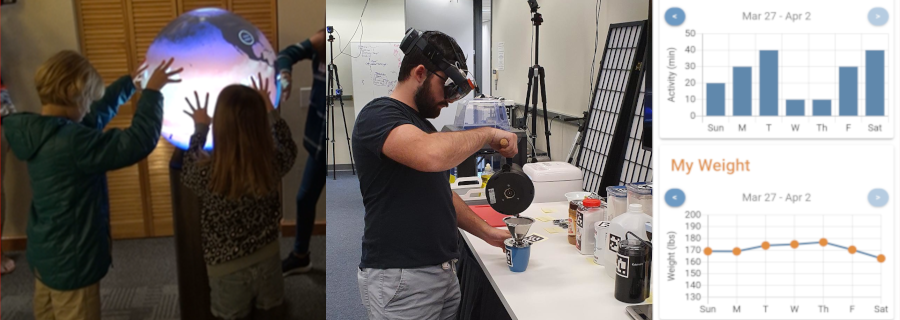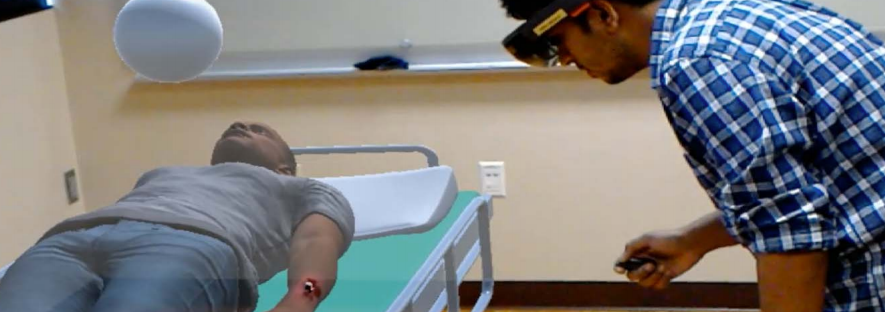TL;DR: apply to join the UF CISE Human-Centered Computing (HCC) PhD program and work with our dozen faculty members on research that emphasizes understanding people, developing new technology, and designing engaging experiences for diverse users, domains, and contexts. Applications are due December 5th: https://www.cise.ufl.edu/academics/grad/phdhcc (Download our flyer!)
Jump to:
- Recruitment
- Research Areas
- Program
- University
- Department
- Location
- HCC@UF
- For More Information
- Graduate Program Director
Recruitment
The University of Florida Department of Computer & Information Science & Engineering (CISE) is recruiting applicants for its Human-Centered Computing (HCC) Ph.D. program for 2024-2025 admission! Applications are due December 5th. The UF HCC Ph.D. program is a growing, vibrant degree with over 40 current students, and our two dozen graduates have gone onto positions as tenure-track faculty, industry UX researchers, instructional teaching track faculty, and more. The UF HCC PhD program emphasizes understanding people, developing new technology, and designing engaging experiences for a variety of target users, domains, and contexts. The highlight of the program includes a self-defined “cognate area“: each student chooses a set of three courses (from any department) that inform their interdisciplinary training to strengthen the foundation of their thesis research. For more information: https://www.cise.ufl.edu/academics/grad/phdhcc
Research Areas:
Our research spans many areas of HCC: Advanced Learning Technologies, Affective Computing, AI Education, Computer Science Education, Graphics, Human-Computer Interaction, Human Studies, Immersive Virtual Environments, IT Policy and Workforce Development, Natural User Interfaces, Personalized Learning, Programming Language Translators, Software Engineering, Sonification, Systems, User Experience, Virtual Humans, Virtual / Augmented Reality, and Visualization.
Selected faculty who may be recruiting research assistants for our labs this year:
Lisa Anthony, Ph.D.: Director of the Intelligent Natural Interaction Technology (INIT) lab. Research topics focus on advanced interaction technologies such as touch, speech, and gesture, especially for children in the context of educational or mHealth interfaces. Recent projects explore human-AI interaction and intelligent user interfaces for children and families. INIT Lab projects advance human-computer interaction (HCI) research questions of how users want to interact with these natural modalities, and computer science research questions of how to build recognition algorithms that can understand user input in these ambiguous modalities. For more info: https://init.cise.ufl.edu/
 Kristy Elizabeth Boyer, Ph.D.: The LearnDialogue group researches the ways in which natural language dialogue and intelligent systems can support human learning and sport. We design, develop, and investigate learning environments for collaborative groups including tutorial dialogue, intelligent tutoring, real-time visualizations for sport, virtual agents for learning, and game-based learning. For Fall 2024, we are especially interested in PhD applicants who want to work in one of the following two broad areas: 1) real-time collaborative interfaces for endurance sports, particularly cycling; and 2) artificial intelligence education for K-12. For more info: http://learndialogue.org
Kristy Elizabeth Boyer, Ph.D.: The LearnDialogue group researches the ways in which natural language dialogue and intelligent systems can support human learning and sport. We design, develop, and investigate learning environments for collaborative groups including tutorial dialogue, intelligent tutoring, real-time visualizations for sport, virtual agents for learning, and game-based learning. For Fall 2024, we are especially interested in PhD applicants who want to work in one of the following two broad areas: 1) real-time collaborative interfaces for endurance sports, particularly cycling; and 2) artificial intelligence education for K-12. For more info: http://learndialogue.org
Sharon Lynn Chu, Ph.D.: The Embodied Learning & Experience (ELX) Lab conducts research in two broad areas: learning technologies and technologies for health and well-being. The guiding principle of the lab is to conduct research for real users and in authentic settings. The ELX lab engages in human-centered design and evaluation of both existing and new technologies. Example projects include wearable technologies for learning, Maker-based learning, culturally-relevant computing in education, and motion tracking in learning environments. The ELX group is diverse and very interdisciplinary. For more info: https://cise.ufl.edu/~slchu/research.html
Juan Gilbert, Ph.D.: The Computing for Social Good Lab is focused on designing, building, and evaluating computational technologies as they relate to the human condition and reflecting on how these technologies affect society. Our research covers a variety of areas, including voting/elections technologies, fairness/bias in AI, advanced learning technologies, culturally relevant computing or ethnocomputing, privacy/security, usability and accessibility. The goal is to build innovative solutions to real-world problems by integrating people, information, culture, policy, and technology to address societal issues. For more info: http://www.ComputingForSocialGood.com
Eakta Jain, Ph.D.: Dr. Jain’s research group works on problems at the intersection of computer graphics, virtual reality, computer vision, and human visual perception. The lab’s research goal is to convert gaze data into usable information about a person’s priorities and preferences. By applying the data, algorithms and insights gained from this work, the JainLab works to improve user experience, enhance safety, and create lifelike virtual avatars. For more info: http://jainlab.cise.ufl.edu
Benjamin Lok, Ph.D.: The Virtual Experiences Research Group (VERG) goal is to improve human interactions through training with virtual humans. To that end, VERG researches topics in virtual reality, mixed reality, and virtual humans, and apply these technologies to train healthcare students on interpersonal scenarios to improve the lives and society of those around us. Students work closely with collaborators in fields such as medicine, nursing, communications, psychology, speech pathology, and education. If you are interested in building new virtual experiences to move hearts and minds of learners, see: http://verg.cise.ufl.edu

Kyla McMullen, Ph.D.: The SoundPAD Lab focuses on the Perception, Application, and Development of 3D Audio systems. The lab’s research lies at the intersection of human-centered computing, electrical engineering, and auditory perception. As virtual reality (VR) and augmented reality (AR) becomes more commonplace, significant research is needed to investigate 3D audio’s role in systems of the future. Broadly, the lab’s goal is to elucidate the human factors that must be taken into account in the design and use of 3D audio systems. For more info: https://scholar.google.com/citations?hl=en&user=DzvXnyoAAAAJ&view_op=list_works&sortby=pubdate for collected publications.
Eric Ragan, Ph.D.: The Interactive Data and Immersive Environments (Indie) research lab conducts human-centered research of interactive visualizations. The Indie lab focuses on the design and evaluation of applications and techniques that support effective interaction and understanding of data, information, and virtual environments. Indie research lies under the umbrella of human-computer interaction (HCI), and projects address topics in information visualization, visual analytics, virtual reality, or 3D interaction. For more info: https://www.cise.ufl.edu/~eragan/
Check out some of our current students’ research activities here: https://faculty.eng.ufl.edu/human-centered-computing/phd-students/
Program:
Our Ph.D. students are supported during their time at UF as graduate research assistants (RAs), teaching assistants (TAs), or on internal / external fellowships. Funding covers minimum benefits including: stipend, tuition waiver, health insurance. The Graduate Assistants United (GAU) union advocates for graduate student rights as students and employees in the workplace.
The admissions process includes: (0) application materials due December 5th, (1) application review in mid-December, (2) initial videoconference interviews in late December or early January, (3) admissions first round decisions in early January, (4) early notifications out by late January, (5) student decisions due April 15th. Notification may be received after January for second round decisions.
Our program operates on a research-from-day-one, learn-by-doing model in which Ph.D. students are apprenticed to faculty members in individual labs and train on existing projects before proposing a dissertation topic. Average program completion time is 5 to 6 years. We seek curious students with any background who are passionate about innovating in the interdisciplinary HCC field. Basic computer programming skills (through undergraduate data structures) is preferred. Contact the GPD with specific questions about expectations.
University:
The University of Florida (UF) is the flagship institution of the Florida State System, and is designated as a Pre-Eminent Institution in Florida. Ranked #5 among all U.S. Public institutions by U.S. News & World Report, UF is recognized on the national stage as a top research-productive university. Campus research facilities include the HiPerGator, the most powerful distributed computing cluster at a public university; the Marston Made@UF space and resources for emerging technology development and entrepreneurship; and the Digital Worlds Institute REVE panoramic theatre used for immersive, engaging entertainment, events, and teaching. It is also a welcoming community with an active Graduate Student Association, intramural sports, and high-profile visitors and events.
Department:
UF CISE in particular has a commitment to increasing diversity and broadening participation. Currently, CISE is ranked #1 in terms of numbers of female and underrepresented minority faculty members. Our faculty are leading world-class research, and have been recognized with two recent Fulbright Scholarships; nearly two dozen NSF Career Awards; four IEEE Fellowships; three AAAS Fellowships; two ACM Fellowships; two memberships in the European Academy of Sciences; one SCS Fellowships; one SPIE Fellowship; one IEEE Computer Society Taylor Booth Education Award; one IEEE Computer Society Wallace McDowell Award; one ACM Karl Karlstrom Education Award; one Presidential Award for Excellence in Science, Mathematics and Engineering Mentoring (PAESMEM); and one AAAS Mentor Award. CISE houses dedicated user studies lab space, and multiple motion capture laboratory spaces and advanced interaction hardware labs.
Location:
The University of Florida is located in sunny Gainesville, Florida, in the heart of north-central Florida, approximately two hours north of Orlando, two hours northeast of Tampa, and 90 minutes southwest of Jacksonville. The 27 state parks and trails located less than 100 miles from Gainesville include the famous La Chua Trail, where visitors regularly sight alligators, beautiful water birds, and wild horses. Gainesville, a city of 120,000, also has thriving arts, culture, and nightlife scenes, from the downtown historic district to UF campus, cultural events, botanical gardens, and craft breweries. UF is the center of the Gator Nation, proud home of champion teams in football, basketball, softball, gymnastics, indoor/outdoor track and field, swimming and diving, and tennis.
HCC@UF:
The HCC@UF research community is a coalition of faculty, post-docs, and students, both graduate and undergraduate) who self-identify their research as HCC. We meet monthly for seminars, workshops, socials, and events. This community comes with both professional and personal networking benefits, and is the aspect of our program mentioned most often by our current students and alumni when describing what they value about HCC@UF.
For more information:
HCC@UF Faculty Website: https://faculty.eng.ufl.edu/human-centered-computing/
Application Instructions: https://www.cise.ufl.edu/academics/grad/apply
Department of CISE: https://www.cise.ufl.edu/
CISE HCC Ph.D. program: https://www.cise.ufl.edu/academics/grad/phdhcc
HCC Research area: https://www.cise.ufl.edu/ciseresearch/human-centered-computing
University of Florida: http://www.ufl.edu/
—
HCC@UF PhD Graduate Program Director:
Lisa Anthony, PhD (she/her/hers)
lanthony@cise.ufl.edu
Associate Professor, University of Florida
Computer & Information Science & Engineering (CISE)
GPD office hours (Fall 2023): Thursdays 3-4pm (Eastern)
Go Gators! 🐊